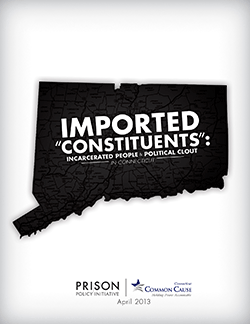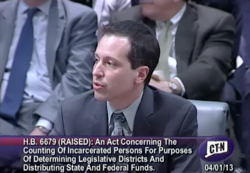Report says Connecticut’s democracy harmed by Census, “prison gerrymandering”
Almost half of the state's prison population comes from the state's five largest cities, but almost two-thirds of the state’s prison cells are located in just five small towns.
April 17, 2013
Contact:
Prison Policy Initiative – Leah Sakala (413) 527-0845Common Cause in Connecticut – Cheri Quickmire (860) 539-6846
If you don’t live next to a large prison, the General Assembly doesn’t think your vote is worth as much, charges a new report released this morning by the Prison Policy Initiative and Common Cause in Connecticut.
The report, “Imported ‘Constituents’: Incarcerated People and Political Clout in Connecticut,” examines how the state’s reliance on Census Bureau data – which counts incarcerated people as if they were residents of prison locations rather than their home communities — enhances the weight of votes cast in districts that contain prisons and dilutes the weight of a vote cast in all other districts. “About 10% of several Connecticut districts are made up of people who aren’t, by state law, residents of those districts,” said report author Peter Wagner.
The report finds that:
- Almost half of the state’s prison population comes from the state’s five largest cities, but almost two-thirds of the state’s prison cells are located in just five small towns.
- There are seven majority-White state house districts that claim at least 1,000 incarcerated people of color as residents of their districts.
- Connecticut state law says that incarcerated people are residents of their homes, not the prison location.
- Not all people in Connecticut prisons are barred from voting. Those who can vote – because they are awaiting trial or are not convicted of felonies — are required by state law to vote absentee as residents of their home districts.
The Connecticut Legislature is currently considering a bill, HB 6679, that would remedy the problem of prison gerrymandering by counting incarcerated people at their home addresses for redistricting purposes. “Right now, the Judiciary Committee has before them a bill that would end prison gerrymandering in Connecticut once and for all,” said Cheri Quickmire of Common Cause in Connecticut. “It’s time to pass this legislation and send the message that every Connecticut resident’s vote should count, regardless of whether or not he or she lives near a big prison.”
Four other states — New York, Maryland, Delaware, and California — have already passed similar legislation, and Maryland’s law was upheld by the U.S. Supreme Court last year.
The non-profit Massachusetts-based Prison Policy Initiative is the nation’s leading authority on how Census counts of prison populations distort the legislative redistricting process. For the last decade the organization has been leading a national movement calling on the Census Bureau to count incarcerated people at home, and the organization’s research inspired four states to pass legislation in 2010 and 2011 to end prison gerrymandering.
Common Cause in Connecticut is a nonprofit, nonpartisan citizens lobby dedicated to improving the way state government operates. Whether it is advocating for opening committee meetings to the public or compelling the passage of the strongest campaign finance law in the nation, Common Cause in Connecticut has been a leading voice in reforming state government.
“Imported ‘Constituents’: Incarcerated People and Political Clout in Connecticut,” is available at http://www.prisonersofthecensus.org/ct/
-30-





